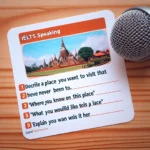As an experienced IELTS Speaking examiner, I understand the importance of being well-prepared for the speaking test. One common topic that often appears in IELTS Speaking Part 2 is describing a time when you were able to resolve a conflict peacefully. This topic not only tests your language skills but also your ability to narrate a personal experience effectively. In this article, we’ll explore how to tackle this topic and provide sample answers to help you achieve a high band score.
 Peaceful Conflict Resolution
Peaceful Conflict Resolution
Part 1: Introduction and Interview
In Part 1, the examiner may ask you some general questions about conflicts and resolution. Here are a few examples:
- Do you think conflicts are common in daily life?
- How do you usually deal with disagreements?
- What do you think is the best way to resolve conflicts?
Let’s look at a sample answer for the third question:
Sample Answer (Band 7-8):
“I believe the best way to resolve conflicts is through open and honest communication. It’s crucial to listen actively to the other person’s perspective and try to understand their point of view. Finding common ground and being willing to compromise can often lead to a peaceful resolution. Additionally, remaining calm and avoiding emotional reactions can help create a more constructive atmosphere for problem-solving.”
Part 2: Long Turn (Cue Card)
Now, let’s focus on the main topic. Here’s a sample cue card you might encounter:
Describe a time when you were able to resolve a conflict peacefully.
You should say:
- What the conflict was about
- Who was involved
- How you resolved it
- And explain why you think it was a peaceful resolution
Remember, you have one minute to prepare and 1-2 minutes to speak. Here’s a sample answer:
Sample Answer (Band 7-8):
“I’d like to talk about a time when I successfully resolved a conflict with my roommate during my university years. The issue arose when we had differing opinions on how to manage our shared living space, particularly regarding cleanliness and noise levels.
The conflict involved my roommate, Sarah, and me. We had been living together for about six months when tensions started to build. I prefer a tidy environment and early nights, while Sarah was more relaxed about cleanliness and enjoyed staying up late.
To resolve the situation, I took the initiative to have an open conversation with Sarah. I approached her calmly and suggested we sit down to discuss our living arrangements. During our talk, I made sure to express my concerns clearly while also actively listening to her perspective. We realized that we both had valid points and agreed to compromise.
We came up with a solution that worked for both of us. We created a cleaning schedule and agreed on quiet hours after 10 PM. Sarah would use headphones when watching movies late at night, and I would be more flexible about occasional noise during weekends.
I consider this a peaceful resolution because we managed to find common ground without any heated arguments or resentment. We both felt heard and respected, and our relationship actually improved after this experience. This situation taught me the importance of open communication, empathy, and willingness to compromise in resolving conflicts peacefully.”
Additional questions the examiner might ask:
- How did you feel during the conflict resolution process?
- What did you learn from this experience?
Sample Answer (Band 8-9):
“During the conflict resolution process, I initially felt a bit apprehensive about broaching the subject, as I was concerned it might lead to an argument. However, as we began to discuss the issues openly, I felt more at ease and optimistic about finding a solution. The experience was ultimately enlightening and rewarding.
This experience taught me several valuable lessons. Firstly, I learned the importance of addressing issues promptly before they escalate. Secondly, it reinforced the power of empathy and trying to see things from another person’s perspective. Lastly, I realized that most conflicts can be resolved peacefully if both parties are willing to communicate honestly and find middle ground. These skills have proven invaluable in both my personal and professional life since then.”
Part 3: Two-way Discussion
In Part 3, the examiner will ask more abstract questions related to the topic. Here are some possible questions and sample answers:
Examiner: Do you think conflicts are inevitable in society?
Sample Answer (Band 7-8):
“I believe conflicts are indeed inevitable in any society due to the diversity of opinions, beliefs, and interests among people. However, what’s crucial is how we manage and resolve these conflicts. A healthy society should have mechanisms in place to address disagreements constructively. This could include promoting dialogue, teaching conflict resolution skills in schools, and having fair legal systems to mediate disputes. While we can’t eliminate conflicts entirely, we can certainly work towards creating a culture that handles them peacefully and productively.”
Examiner: How can technology help in resolving conflicts?
Sample Answer (Band 8-9):
“Technology can play a significant role in conflict resolution in various ways. Firstly, it can facilitate communication between parties who might not be able to meet face-to-face, through video conferencing or online mediation platforms. This is particularly useful for international conflicts or disputes between people in different locations.
Secondly, technology can provide tools for data analysis and visualization, which can help in understanding complex conflicts and finding potential solutions. For instance, mapping software can be used to resolve land disputes by clearly showing boundaries and overlapping claims.
Moreover, artificial intelligence is being developed to assist in conflict resolution by analyzing patterns in disputes and suggesting potential compromises. However, it’s important to note that while technology can be a valuable tool, it should complement rather than replace human judgment and empathy in the conflict resolution process.
Lastly, social media and online forums can create spaces for dialogue and understanding between different groups, potentially preventing conflicts before they escalate. However, these platforms need to be moderated carefully to ensure they don’t become sources of conflict themselves.”
Key Vocabulary and Phrases for High Scores
To achieve a high band score, it’s crucial to use a range of vocabulary and complex sentence structures. Here are some key terms and phrases that can elevate your speaking:
-
Mediate /ˈmiːdieɪt/ (verb): to try to end a disagreement between two or more people or groups by talking to them and trying to find things that everyone can agree on.
Example: “A neutral third party was brought in to mediate the dispute between the two departments.” -
Compromise /ˈkɒmprəmaɪz/ (noun/verb): an agreement in an argument in which the people involved reduce their demands or change their opinion in order to agree.
Example: “Both parties had to make compromises to reach a mutually acceptable solution.” -
Reconciliation /ˌrekənsɪliˈeɪʃn/ (noun): the process of making two opposite beliefs, ideas, or situations agree.
Example: “The peace talks aimed at achieving reconciliation between the two conflicting nations.” -
Diplomatic /ˌdɪpləˈmætɪk/ (adjective): having or showing an ability to deal with people in a sensitive and effective way.
Example: “Her diplomatic approach to the sensitive issue helped calm tensions in the office.” -
Empathy /ˈempəθi/ (noun): the ability to understand and share the feelings of another.
Example: “Showing empathy towards your opponent’s position can often lead to a breakthrough in negotiations.”
Examiner’s Advice
To excel in the IELTS Speaking test, particularly when discussing conflict resolution, keep these tips in mind:
-
Use personal experiences: Whenever possible, draw from real-life situations. This adds authenticity to your answers and helps you provide specific details.
-
Demonstrate reflection: Show that you’ve learned from your experiences by discussing the lessons or insights gained from the conflict resolution process.
-
Use a range of tenses: When narrating your experience, use past tenses accurately. When discussing general ideas about conflict resolution, use present tenses.
-
Employ complex structures: Use conditional sentences, relative clauses, and other advanced grammatical structures to showcase your language proficiency.
-
Practice active listening: During the test, listen carefully to the examiner’s questions and respond directly to what is asked.
-
Stay calm and confident: Even if you’re discussing a conflict, maintain a composed demeanor. This reflects your ability to handle challenging situations calmly.
By following these guidelines and using the sample answers as inspiration, you’ll be well-prepared to tackle questions about peaceful conflict resolution in your IELTS Speaking test. Remember, the key is to practice regularly and focus on expressing your ideas clearly and confidently.


